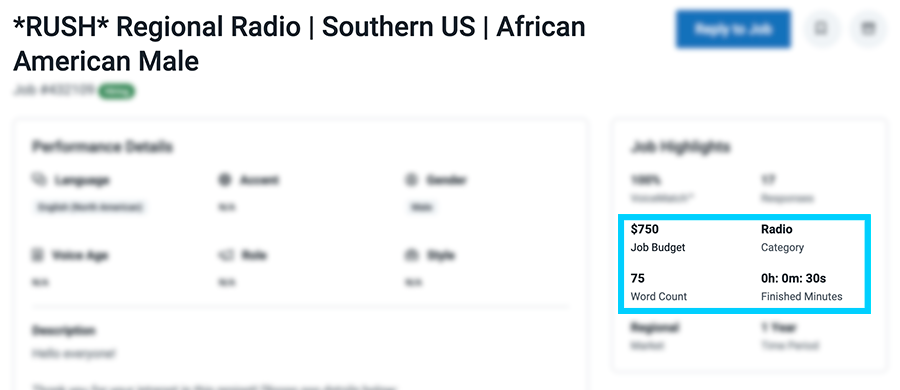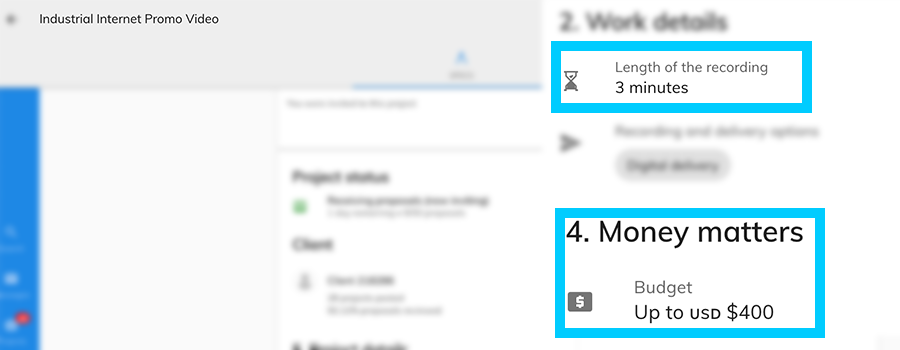Before you get started learning how to become a voice actor, you'll probably want to have an idea of how much money voice actors make. (Check out the real-life examples below to see exactly how much median voice actors get paid)
This way, you'll know whether or not a career in voice-over will pay you well enough to meet your needs.
Fortunately, one of the greatest & most freeing benefits to having a voice-over career is the ability to earn as much income as you want.
This may sound too good to be true, but there is a direct correlation to the effort you put forth and how much money you can make as a voice actor.
While having hustle helps, making smart decisions is even more important.
That's because the amount of money a professional voice actor makes will depend on a few important factors (most of which you have complete control over).
How Much Do Voice Actors Get Paid?
One factor that has a major impact on how much a voice actor makes is whether the entry-level voice actor is union or non-union.
While the union (SAG/AFTRA) may offer higher-paying jobs, the number of jobs is fewer, and the competition is pretty fierce.
As a non-union voice actor, you're able to set your own voice-over rates. This means you can still have access to jobs that pay just as much or more than union rates.
A second factor that'll determine how much a voice actor earns is the type of voice-over (or voice-over niche) being recorded. For example, based on an hourly rate, audiobooks tend to pay less per hour than other niches like commercials.
Another factor that plays a role in how much the voice actor makes is where the voice-over jobs come from.
Freelancer websites (like Fiverr & Upwork) are notorious for low-paying jobs.
Online casting sites (also known as pay-to-play) have higher budgets and post several auditioning opportunities every day.
And voice-over jobs that come via agents or direct marketing efforts of your own tend to be some of the most lucrative voice-over work available to non-union voice actors.
A final factor to mention that can affect how much a voice actor makes is how well the voice actor knows how to run a business.
Don't make the mistake of thinking creative skill is all you need, voice-over is also a business.
Remember, landing a voice-over job is great, but on-going repeat client relationships are what can really skyrocket a voice actor's income.
Examples of How Much Money Voice Actors Make
One of the best ways to get an idea of how much money voice actors make is with real-life examples.
Let's take a look at a few recent voice-over job opportunities and see how much money a hired voice actor was able to earn:
How Much do Voice Actors Make? - Example #1

This job posting was for 75 words, which works out to be 30-seconds of voice-over. It was for a radio commercial, and the budget was $750.
How Much do Voice Actors Make? - Example #2

This project consisted of recording the voice-over for a bike product video. The word count was 250, which is just over one-and-a-half minutes. The budget for this project was $1,000 to $1,249.
How Much do Voice Actors Make? - Example #3

This is a project that was posted on a freelancing website for a voice-over to be used on a presentation. The job listed 60 minutes as the estimated finished time and a budget of $1,000.
How Much do Voice Actors Make? - Example #4

This industrial promo voice-over for the web was 3 minutes long, and the budget was $400.
These examples are just a few of the thousands of voice jobs that pop up every day. Some will pay much less, and some will pay much more.
In the end, how much you could earn from voice acting depends on how many jobs you book, which really comes down to other factors, including your auditioning and performance skills.
Hopefully, this gives you a better idea of how much voice actors make in case you decide you want to learn how to become a voice actor yourself.
Setting Your Voice Actor Rate
One of the most critical aspects of voice acting as a business is setting your annual voice actor salary. It’s an essential step that dictates your value and overall average voice actor salary. Here are the steps and factors to consider:
Understand Your Market and Positioning
Firstly, it's crucial to know your market and your positioning within it. How much experience do you have? What is your voice-over niche (commercials, video games, audiobooks, etc.)? How well known are you in the voice acting industry? These factors will affect your potential rates.
Additionally, investigate what others in your specific niche are charging. Resources like the Global Voice Acting Academy's Rate Guide can provide valuable benchmarking information.
Remember, however, that the rate an experienced voice actor can command is closely tied to their voice talent, experience, and reputation, so these should be viewed as guidelines rather than fixed rules.
Factor in Your Operating Costs
Take into account all your business expenses. This includes your home studio costs (if applicable), recording and editing software, training, marketing costs, taxes, and any other expenses. Your rate needs to cover these costs and still leave you with a profitable income.
Value Your Time
Your rate should also consider the time it takes to complete a project. This isn't just the recording time but also includes preparation (like reading scripts and researching pronunciations), editing and retouching audio, and administrative work.
Just like television and radio artists, some voice actors charge per hour, and some charge per project or per word. Make sure you're not undervaluing the time it takes to complete a voice-acting job.
Consider The Usage
The scope of how the voice-over will be used can also affect your rate. If the voice-over will be used for a local radio ad, that may command a lower fee than a national TV ad or a video game that will sell millions of copies. If a client wants exclusive rights to your voice or needs the recording for an extended period, this should also be factored into the rate.
Adjust Rates As Necessary
Once you've set your initial rates, don't be afraid to adjust them as necessary. As you gain more experience, improve your skills, or expand your client base, you should consider increasing your rates accordingly.
Provide Clear Quotes
Whenever you provide a quote to a potential client, make sure it's clear what that quote includes. Specify what services are included (like recording, editing, retouches, etc.) and any potential additional costs.
Negotiate
Don't be afraid to negotiate. If a client can't meet your rates, instead of discounting right away, see if there are other aspects of the job you could adjust (like the scope of usage rights, number of retakes, etc.). Remember, your rate is a reflection of your value. It's okay to say no to jobs that don't meet your rate expectations.
FAQs
Do voice actors make good money?
The voice acting salary of an average voice actor can vary greatly, but successful, experienced voice actors can make a good living. Several factors influence a voice actor's earnings, including whether they're union or non-union, the type of voice-over work they do, their skills, experience, marketing efforts, and their sources of jobs.
Those who can effectively run their voice-over work as a business, diversify their income streams, and secure repeat clients can potentially earn a significant income.
How much do voice actors make per role?
This is highly variable depending on many factors. Some professional voice actors might make a few hundred dollars for a short job, while others might make several thousand dollars for a larger project. For example, an actor voicing a character in a video game could earn anything from a few hundred to several thousand dollars.
If they're doing an audiobook, they might earn $100-$400 per finished hour. Some high-paying industries for voice actors include advertising, where a single commercial can net a voice actor anywhere from $200 to several thousand dollars, depending on the campaign's scale and exposure.
Who is the richest voice actor?
Some of the richest voice actors include Matt Stone and Trey Parker, creators and primary voice actors of "South Park", who have amassed significant wealth through their work.
Also, Seth MacFarlane, creator and voice actor in "Family Guy," has a high net worth. However, remember that these individuals aren't just voice actors; they're also writers, producers, and creators. Many successful voice actors diversify their income and build wealth in various ways related to their primary voice-over work.
Who is the lowest paid voice actor?
Voice actors who are just starting out or who work in lower-paying areas of the industry, such as on certain online platforms or in non-union jobs, might earn lower rates. In some cases, new voice actors might only make a few dollars for a short job.
It's worth noting that, like any industry, voice acting has a broad pay range, and it often takes time, effort, and strategic career choices to move up the pay scale.

This is maybe the greatest help for a job I was thinking to get myself in. I am still thinking about it, but now I have idea about how and what.
And, I still cannot believe it was for free…
Happy to hear it’s helping you and that you’re finding value in the resources! Thanks for the comment!